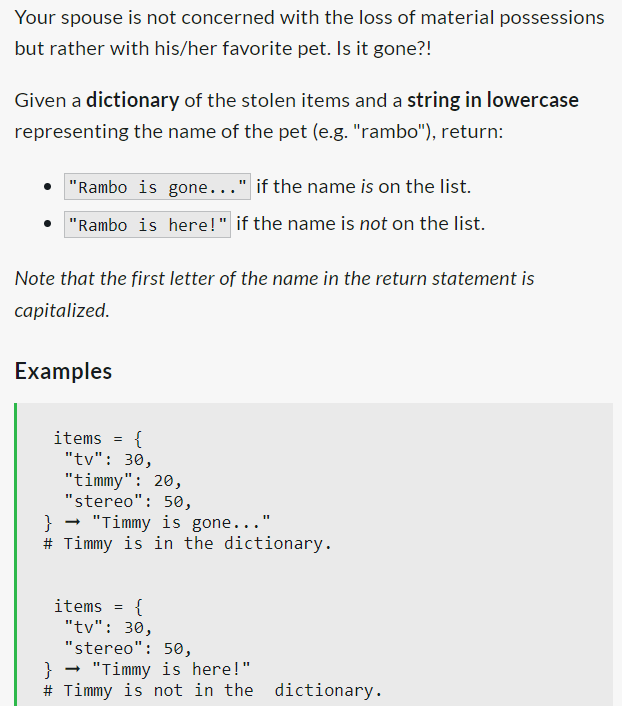Your spouse is not concerned with the loss of material possessions but rather with his/her favorite pet. Is it gone?! Given a dictionary of the stolen items and a string in lowercase representing the name of the pet (e.g. "rambo"), return: "Rambo is gone..." if the name is on the list. "Rambo is here!" if the name is not on the list. Note that the first letter of the name in the return statement is capitalized. Examples items = { "tv": 30, "timmy": 20, "stereo": 50, } → "Timmy is gone..." # Timmy is in the dictionary. { "tv": 30, items = "stereo": 50, } → "Timmy is here!" # Timmy is not in the dictionary.
Your spouse is not concerned with the loss of material possessions but rather with his/her favorite pet. Is it gone?! Given a dictionary of the stolen items and a string in lowercase representing the name of the pet (e.g. "rambo"), return: "Rambo is gone..." if the name is on the list. "Rambo is here!" if the name is not on the list. Note that the first letter of the name in the return statement is capitalized. Examples items = { "tv": 30, "timmy": 20, "stereo": 50, } → "Timmy is gone..." # Timmy is in the dictionary. { "tv": 30, items = "stereo": 50, } → "Timmy is here!" # Timmy is not in the dictionary.
Computer Networking: A Top-Down Approach (7th Edition)
7th Edition
ISBN:9780133594140
Author:James Kurose, Keith Ross
Publisher:James Kurose, Keith Ross
Chapter1: Computer Networks And The Internet
Section: Chapter Questions
Problem R1RQ: What is the difference between a host and an end system? List several different types of end...
Related questions
Question

Transcribed Image Text:Your spouse is not concerned with the loss of material possessions
but rather with his/her favorite pet. Is it gone?!
Given a dictionary of the stolen items and a string in lowercase
representing the name of the pet (e.g. "rambo"), return:
"Rambo is gone..." if the name is on the list.
• "Rambo is here!" if the name is not on the list.
Note that the first letter of the name in the return statement is
capitalized.
Examples
items
{
"tv": 30,
"timmy": 20,
"stereo": 50,
→
}
"Timmy is gone..."
# Timmy is in the dictionary.
=
items
{
"tv": 30,
=
"stereo": 50,
}
→ "Timmy is here!"
# Timmy is not in the dictionary.
Expert Solution
This question has been solved!
Explore an expertly crafted, step-by-step solution for a thorough understanding of key concepts.
Step by step
Solved in 2 steps with 1 images

Recommended textbooks for you

Computer Networking: A Top-Down Approach (7th Edi…
Computer Engineering
ISBN:
9780133594140
Author:
James Kurose, Keith Ross
Publisher:
PEARSON

Computer Organization and Design MIPS Edition, Fi…
Computer Engineering
ISBN:
9780124077263
Author:
David A. Patterson, John L. Hennessy
Publisher:
Elsevier Science

Network+ Guide to Networks (MindTap Course List)
Computer Engineering
ISBN:
9781337569330
Author:
Jill West, Tamara Dean, Jean Andrews
Publisher:
Cengage Learning

Computer Networking: A Top-Down Approach (7th Edi…
Computer Engineering
ISBN:
9780133594140
Author:
James Kurose, Keith Ross
Publisher:
PEARSON

Computer Organization and Design MIPS Edition, Fi…
Computer Engineering
ISBN:
9780124077263
Author:
David A. Patterson, John L. Hennessy
Publisher:
Elsevier Science

Network+ Guide to Networks (MindTap Course List)
Computer Engineering
ISBN:
9781337569330
Author:
Jill West, Tamara Dean, Jean Andrews
Publisher:
Cengage Learning

Concepts of Database Management
Computer Engineering
ISBN:
9781337093422
Author:
Joy L. Starks, Philip J. Pratt, Mary Z. Last
Publisher:
Cengage Learning

Prelude to Programming
Computer Engineering
ISBN:
9780133750423
Author:
VENIT, Stewart
Publisher:
Pearson Education

Sc Business Data Communications and Networking, T…
Computer Engineering
ISBN:
9781119368830
Author:
FITZGERALD
Publisher:
WILEY